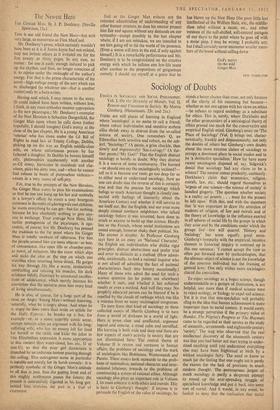The Newest Hero
THE GINGER MAN. By J. P. Donleavy. (Neville Spearman, 15s.) Tins is our old friend the New Hero—but writ very large, as monstrous as Finn MacCool.
Mr. Donleavy's prose, which certainly wouldn't have been as it is if James Joyce had not existed, may not irritate others as it irritated me for the first twenty , or thirty pages. In any case, no matter : for one is easily enough induced to pick up the rhythm, and then, no longer conscious of it. to rejoice under the onslaught of the author's energy. For that is the prime characteristic of his novel—high-voltage energy of the sort which can be discharged (to whatever use—that is another matter) only by a born writer.
Having said which. I may return to the story. (It could indeed have been written, without loss, I think, in any more orthodox manner appropriate to the new picaresque.) Mr. Donleavy's exemplar of the New Heroism is Sebastian Dangerfield, the Ginger Man upon whom he calls down (rather hopefully, I should imagine) GOd's mercy at the close of the last chapter. He is ayoung American 'veteran' who has come under the GI Bill of Rights to read law at Trinity College, Dublin, picking up on the way an English middle-class wife, on whose unfortunate person he has fathered a daughter. In Dublin he boozes himself silly, philosophies incoherently with another ex-GI crony, forniCates in coalsheds and else- where, picks his dirty toes, and—when he cannot find release in bouts of purposeless violence— sweats in a very sauna of self-pity.
For, true to the precepts of the New Heroism, the Ginger Man wants to pass his examinations so that he too can hang up his hat and umbrella in s lawyer's office; he wants a cosy bourgeois existence in the midst of adoring wife and children; he wants everything he can get--but for nothing, because he has absolutely nothing to give any- one in exchange. Your average New Hero, like earlier protagonists of the picaresque, is ego- centric, of course; but Mr. Donleavy has pressed the tradition to the far point where his Ginger Man is totally univkare of Otherness. For him the people around him are mere objects—at best, of convenience, like open tills or chamber-pots; at worst, ,of irritation, like the razor whiCh slips and nicks the chin or the step on which one stumbles when returning home drunk. He gorges his way through life like a worm, instinctively contracting and relasing his muscles, his dark existence fitfully illumined by occasional recollec- tions of adolescence, which merely increase his conviction that the universe owes him every kind of living simultaneously.
He is also, of course, for a large part of the
s time, an Angry Young Matt—without knowing, naturally, what he is.angryiabout. And when he is angey he does more than write an article for the Daily Express: he breaks up a bar, for example—or. in a more superbly comic scene, stumps upstairs after an argument with his long- suffering wife, who has no money left for food for herself or the child, and kicks the jakes in (the Elizabethan expression is more appropriate in this context than water-closet, loo, etc., U or non-U), so that the poor girl downstairs is drenched by an ordurous torrent pouring through the. ceiling. This outrageous scene in particular is notable.not merely for • its harsh comedy : it is perfectly synrib.olic, of the Ginger Man's attitude to all that is past. Into the gaping front end of this mighty earthworm passes the future; the present is conVulsively digested in his long gut; behind him stretches the past in a trail of excrement.
THE
Just as the Ginger Man evinces not the remotest adumbration of understanding of any other human creature, so does his creator present him fair and square without any demands on our sympathy—except possibly in the last chapter where, if I am not mistaken, we are intended to see him going off to rid the world of his presence. (Even a worm will turn in the end, if only against himself.) It is a remarkable performance and Mr. Donleavy is to be congratulated on the creative energy with which he inflates one low-life scene after another to the proportions of gargantuan comedy. I should say myself at a guess that he has blown up the New Hero (the poor little lost intellectual of the Welfare State, etc., the middle-
class rebel without a cause, etc., and other versions of the soft-shelled, soft-centred paragon of our days) to the point where he goes off with a moist plop. I may be wrong; I probably am; but I shall certainly never encounter smaller mem- bers of the breed without calling down God's mercy On the wild Ginger Man.


































 Previous page
Previous page